|
De Welshe dichter Ronald Stuart Thomas werd geboren op 29 maart 1913 in Cardiff. Zie ook alle tags voor R. S. Thomas op dit blog.
A Blackbird Singing
It seems wrong that out of this bird,
Black, bold, a suggestion of dark
Places about it, there yet should come
Such rich music, as though the notes'
Ore were changed to a rare metal
At one touch of that bright bill.
You have heard it often, alone at your desk
In a green April, your mind drawn
Away from its work by sweet disturbance
Of the mild evening outside your room.
A slow singer, but loading each phrase
With history's overtones, love, joy
And grief learned by his dark tribe
In other orchards and passed on
Instinctively as they are now,
But fresh always with new tears.
A Welshman to any Tourist
We've nothing vast to offer you, no deserts
Except the waste of thought
Forming from mind erosion;
No canyons where the pterodactyl's wing
Falls like a shadow.
the hills are fine, of course,
Bearded with water to suggest age
And pocked with cavarns,
One being Arthur's dormitory;
He and his knights are the bright ore
That seams our history,
But shame has kept them late in bed.
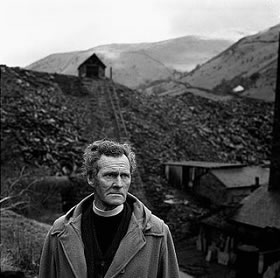
R. S. Thomas (29 maart 1913 – 25 september 2000)
De Canadese dichter, schrijver en vertaler Jacques Brault werd geboren op 29 maart 1933 in Montreal. Zie ook alle tags voor Jacques Brault op dit blog.
patience
nous ne partirons pas
cette banquise neurasthénique porte l’espoir
des morts qui ne sont pas nés
si belle soit la terre promise ailleurs en d’autres mondes
ce n’est pas ici
nous gèlerons sur place comme pères et mères
nous craquerons de froid de folie
nous ne partirons pas
que s’amènent les siècles les semaines les tiédeurs
de toundra les planètes apprivoisées
nous ne partirons pas
derniers parmi les derniers plus pauvres que les plus
pauvres
sauvages des musées galaxiques caves des cris caverneux
nous ne partirons pas
assignés à demeure survolés de chimères croyables
repoussés
de terre la plus inhabitable taxés d’insomnies vidés
d’enfants viables mal logés entre les os et les os rayés
des dictionnaires sans plus rien des choses peut-être
humaines
nous ne partirons pas
nous ne partirons pas

Jacques Brault (Montreal, 29 maart 1933)
De Engelse schrijver Maurice Denton Welch werd geboren op 29 maart 1915 in Sjanghai. Zie ook alle tags voor Denton Welch op dit blog.
Uit: In Youth Is Pleasure
“Orvil took the book back with him to the crowded court and found a chair in a corner. His eye followed the glass trolleys axiously. A waiter approached and put down the teapot and hot-water jug of that frosted-looking silver found only in hotels. Orvil poured out a cup of tea and waited impatiently for the cakes. His eyes were already eating them up as the man steered the trolley towards him. The little cakes lay helpless on their plates and seemed to call to him. He took in at a glance the square ones covered with jam, sprinkled with coconut and topped with glistening cherries; the round shortbread ones with portholes to show the bright lemon curd inside; the small tarts of criss-cross lattice-work; the phallic chocolate and coffee eclairs, oozing fat worms of cream; the squares of sponge, enclosed in four hard slabs of chocolate and dressed with wicked green beauty-spots of pistachio nut.
Orvil had one of each sort put on a plate before him. He hardly dared ask for so many, and only achieved it by refusing to look at the waiter. He fixed his gaze on the distance until the waiter left him; then he bowed his head, opened the book, and began to eat.”
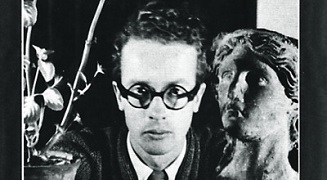
Denton Welch (29 maart 1915 – 30 december 1948)
De Franse schrijver en toneelauteur Marcel Aymé werd geboren op 29 maart 1902 in Joigny. Zie ook alle tags voor Marcel Aymé op dit blog.
Uit: Les contes du chat perché
« De grand matin, Marinette entrouvrit les yeux et il lui sembla qu'entre ses cils elle apercevait dans le lit de sa sœur deux grandes oreilles poilues qui bougeaient sur l'oreiller. Elle-même se sentait assez mal couchée, comme embarrassée de sa personne, empêtrée dans les draps et les couvertures. Néanmoins, le sommeil l'emporta sur la curiosité, et ses paupières se refermèrent. Delphine, tout ensommeillée elle aussi, jeta sur le lit de sa sœur un coup d'œil rapide. Elle le trouva bien volumineux, étrangement ballonné, et se rendormit néanmoins. Un instant plus tard elles se réveillaient pour de bon et louchaient sur le bas de leurs figures qui leur paraissaient s'être allongées et avoir changé d'aspect. En tournant la tête vers le lit de Marinette, Delphine poussa un cri. Au lieu de la tête blonde qu'elle croyait voir sur l'oreiller, il y avait une tête de cheval. De son côté, Marinette ne fut pas moins surprise d'avoir une face d'âne en vis-à-vis et poussa également un cri. Les deux pauvres soeurs roulant de gros yeux, tendaient le cou hors de leur lit pour se regarder de plus près et avaient peine à comprendre ce qui leur était arrivé. Chacune se demandait où avait bien pu passer sa sœur et pourquoi une bête avait pris place dans son lit. Marinette avait presque envie d'en rire, mais s'étant elle-même examinée, elle vit son poitrail, ses membres poilus munis de sabots et compris que les vœux de la veille s'étaient réalisés. Delphine regardait aussi son poil gris, ses sabots, l'ombre de ses grandes oreilles sur le drap blanc, et la vérité lui apparut. Elle poussa un soupir qui fit un grand bruit en passant sur ses lèvres molles. »
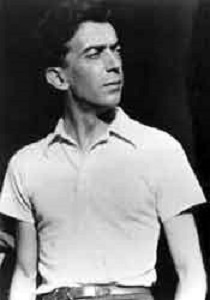
Marcel Aymé (29 maart 1902 – 15 oktober 1967)
De Surinaamse dichter, schrijver en politicus R. Dobru (pseudoniem van Robin Ewald Raveles)werd geboren inParamaribo op 29 maart 1935. Zie ook alle tags voor R. Dobru op dit blog.
Uit: Wan monki fri. Bevrijding en strijd
“Toen ik terug was in de stad na het familiefeest op de plantage, was ik weer een aantal ervaringen rijker. Ik wist iets meer van mijn volk. In dit geval dan van de Neger. Maar allerlei vragen bleven door mijn hoofd dwarrelen. Een heleboel oude dogma's waren weer kapotgeslagen. Ik moest antwoorden hebben. Wi Egi Sani hield toen in 1957 haar eerste kultureel kongres. Er waren afgevaardigden van de afdelingen op de Antillen en in de Verenigde Staten van Amerika overgekomen. Ik zou daar horen wat de doelstellingen waren. Eén van de inleidingen over religie zou door zekere Dr. Jan Voorhoeve worden gehouden. Wi Egi Sani is een idee, was er gezegd. Heeft niets maken met ras. Toch was het voor mij een teleurstelling toen ik merkte dat die Voorhoeve een bakra was. Ik weet niet waarom, maar ik had gedacht, dat de mensen van Wi Egi Sani blanken haatten. Naarmate de man sprak, kreeg ik meer en meer sympathie voor hem. Voor het eerst ontmoette ik een progressieve Hollander. Na de lezing stelde ik één vraag. Dat is het enige wat ik mij herinner van het hele kongres. Ik vroeg aan Dr. Voorhoeve: Is winti zonde? Een typische vraag, die kwam uit het denkschema dat ons met de paplepel was ingegeven. Het antwoord was keihard, zonder aarzeling: Neen!
Je moet weten, Voorhoeve was niet de eerste de beste Patata. Hij was hier voor het vertalen van de Bijbel in het Sranantongo. Voor de Broedergemeente! Hij trad in mijn kerk soms op als predikant. Hij had theologie gestudeerd. Ik was overdonderd. Stupéfait.
Toch was dat het antwoord dat ik wilde hebben. Ik was naar aanleiding van de ervaringen op de plantage reeds tot de konklusie gekomen, dat het doen aan winti geen afgoderij kon zijn.
Anders zouden de Bijbel en Gods naam er niet aan te pas kunnen komen. Mijn grootvader was voorlezer in de kerk van Pemba. Maar dit antwoord krijgen van een Hollander, was het laatste wat ik me had kunnen voorstellen.”
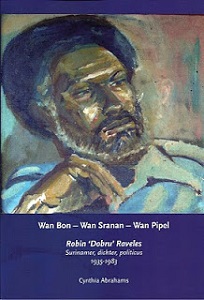
R. Dobru (29 maart 1935 - 17 november 1983)
Cover van een proefschrift over Dobru
De Hongaarse schrijver Jenő Rejtő (eig. Reich Lajos) werd geboren op 29 maart 1905 in Boedapest. Zie ook alle tags voor Jenő Rejtő op dit blog.
Uit: The Embezzled Bank Teller (Vertaald door Enikö Bene)
“As a matter of fact Mr. Curzon didn't embezzle. If we wanted to portray precisely the situation we would say that this gentle, weak charactered man was left alone with twenty thousand dollars, and the money taking advantage of an unguarded moment, embezzled one of the tellers from the bank. Within the Earth's atmosphere everything is magnetic. We all know people whose relationship to objects is not dictated by their own will, but on the contrary, their actions are influenced by momentary ideas of different objects.
It is a well-known type of citizen who decides, that starting today, he will save, but the attraction of a poster in front of a cinema changes his mind. "Oh, tomorrow", he says and buys a ticket for the afternoon show. Or who doesn't know a friend with hyperacidity, who for five years every day postpones keeping a strict diet, because when he's the most decided, they serve him veal stew. "What luck! Veal stew; with a little bit of juice, and with golden dumplings!" His favorite meal! The dish attracts his will again and let us tell you that it would attract it even if it were cabbage rolls. (With sour crème and smoked pork loin.)
Things went well with Mr. Curzon too, as long as he didn't have to confront alternative possibilities. Somebody else's orders dictated his daily routine. In the first place, among these people stood Mr. Mayfield, the president of Sydney Savings Bank, an annoying, very strict, unpleasant gentleman, who welcomed the late employees with a pocket watch in his hands. Mr. Mayfield with his pocket watch was a constant vision for Mr. Curzon, who was only late twice in ten years.Despite this, Mr. Mayfield warned him that if he was late one more time in the next ten years, he would be forced to take disciplinary measures, since he couldn't tolerate repeated unpunctuality. His other despot was Mrs. Hutkins, his 170 pound land lady, who cooked her own favorite dishes for Mr. Curzon. And since her taste fluctuated between fried cod and roasted veal liver, Mr. Curzon was forced to be content with these two kinds of dishes, though he would have given everything for a schnitzel. He only tried once to go secretly to a restaurant, but Mrs. Hutkins found out about his rebellion and ever since, Mr. Curzon took heed from such a blunder. »
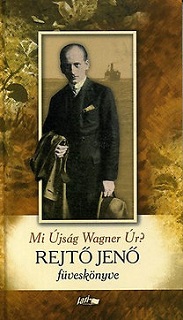
Jenő Rejtő (29 maart 1905 – 1 januari 1943)
De Duitse schrijver Johann Karl August Musäus werd geboren op 29 maart 1735 in Jena. Zie ook alle tags voor Johann Musäus op dit blog.
Uit: Moralische Kinderklapper
„Frau Fabian in Paderborn, weiland Herrn Fabians nachgelassene Wittwe, war so reich wie unsre liebe Frau zu Loretto, und auch eben so erblos. Ihr einziger Sohn bedurfte keiner irdischen Erbschaft mehr, er war bereits in der Ewigkeit. Weil sie sich nun nicht so streng bevormunden ließ, und doch eben so mild und gutthätig war, als die welsche Himmelsköniginn, übte sie verhältnißweise mehr Werke der Wohlthätigkeit aus, als jene, ob sie gleich nicht mit dem Talent Wunder zu thun begabt war.
Bejahrte Damen und Unmündige, die wohl bey Mitteln sind, ködern leicht die Haabsucht an, sie bey lebendigem Leibe zu beerben: denn zu erben, wer sich darauf versteht, kostet nicht halb so viel Müh, als zu erwerben. Auf die reiche Wittwe in Paderborn wurde in dieser Absicht manche feine Spekulation gemacht, davon zuweilen eine gelang, manche auch mißrieth. Richter und Sachwalter streckten die gierigen Krallen nach ihrem Haab und Gut vergebens aus: sie lebte friedsam und rechtete mit niemand. Die Aerzte konnten ihr auf keiner ihrer gewöhnlichen Heerstraßen beykommen, weder oberwärts noch unterwärts: sie lebte frugal und ihre eherne Gesundheit trotzte allen Arzeneyen. Die Klerisey zog von ihr wenig Renten: sie lebte fromm, und hatte auf dem Kerbholz des Gewissens mehr an guten Werken, als Paßwa an Sündenschuld. Aber Arme und Nothleidende, Preßhafte und Gedrückte setzten ihr Mitleid fleißig in Kontribution. Menschenelend fand immer einen gebahnten Weg zu ihrem guten Herzen. Doch hatte sich die insolente Bevölkerungszunft, die für ihr Häschen gern ein Gräschen auf fremden Grund und Boden pflückt, auch einen Schleifweg dazu gebahnt, und sprang kecklich über den Zaun ihrer Gutmüthigkeit.“
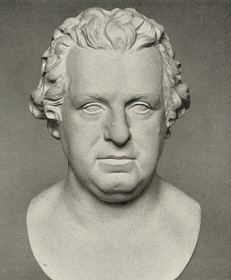
Johann Musäus (29 maart 1735 – 28 oktober 1787)
Gipsen borstbeeld door Gottlieb Martin Klauer,rond 1784.
29-03-2014 om 00:00
geschreven door Romenu 
Tags:R. S. Thomas, Jacques Brault, Denton Welch, Marcel Aymé, R. Dobru, Jenő, Rejtő,, Johann Musäus, Romenu
|

